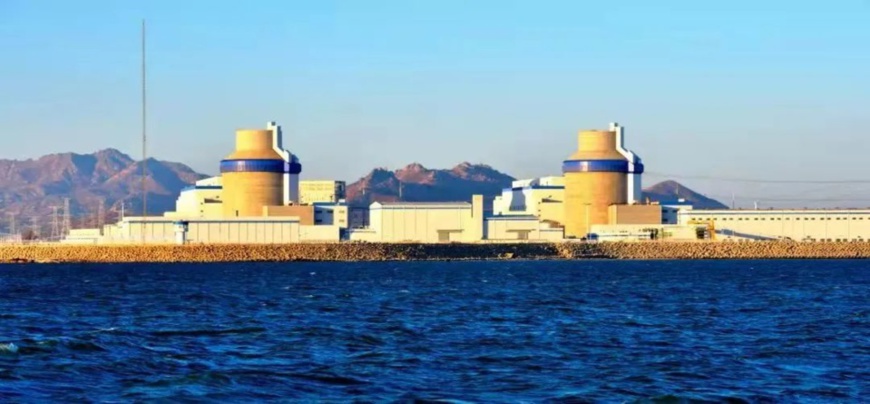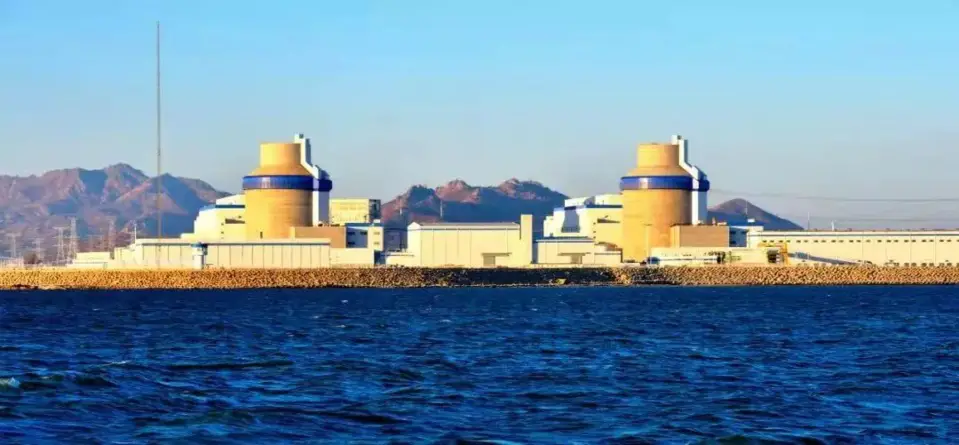By Xu Peiyu, People’s Daily

Haiyang nuclear power plant in Haiyang city, east China’s Shandong province. (Photo/State-owned Assets Supervision and Administration Commission of the State Council)
On April 1, a commercial nuclear heating project launched by the State Power Investment Corporation Limited (SPIC) overfulfilled the task of ensuring heating for urban residents of Haiyang, a county-level city in east China’s Shandong province, during the first heating season since it was put into operation, making Haiyang the first Chinese city to enjoy a winter with carbon-free heating.
During the heating season, the project supplied heat to users from all urban areas in a continuous and stable manner for 143 days, with its services covering an area of nearly five million square meters and benefiting 200,000 urban residents of Haiyang. Meanwhile, various performance indicators of the project reached design requirements and the whole system of the project worked well.
It’s believed that the project has provided the first nuclear heating scheme for an entire county-level city that can be replicated and promoted in other cities across China, which represents an important contribution to the realization of clean heating in northern China.
The nuclear heating project in Haiyang has received wide praise from local residents. According to them, room temperature of their houses was quite stable, and unlined clothing was warm enough for the elderly and children; the nuclear heating project has not only helped extend the heating season, but lower the heating bills.
“The pollution-free nuclear heating project enabled us to bid farewell to dependence on coal for heating. We have truly benefited from the development of nuclear energy,” said a resident.
The project has taken many measures to ensure the safety of heat supply, including building multiple isolation barriers to make sure no direct connection exists between nuclear power plant and end-users, and employing online monitoring equipment to guarantee that the process of heat supply is absolutely safe.
In the project, steam is first extracted from nuclear generating unit to be used as heat source, and then multi-stage heat exchange is carried out in physical isolation before heat is finally transferred to the houses of users.
In 2018, when the world’s largest cogeneration unit, No. 1 unit of Haiyang nuclear power plant was put into commercial operation, Shandong Nuclear Power Company (SDNPC), a subsidiary of the SPIC and also the operator of Haiyang nuclear power plant, took the lead in the research and practice of cogeneration using large-scale pressurized water reactors together with the local government.
In 2019, they put into operation the first phase of China’s first commercial nuclear heating project; and last year, they put into service the second phase of the project, which has covered all the urban areas of Haiyang city with nuclear heating service.
The second phase of the project has shown significant environmental benefits. It has not only raised the air quality in Haiyang city during the heating season, but effectively improved the marine ecology and environment of its surrounding areas.
During the first heating season since it was put into operation in November 2021, the second phase of the project provided two million gigajoules (GJ) of clean heat and replaced 12 coal-fired boilers. Compared with heat supply in the past, it can, in every heating season, save 180,000 tons of raw coal, which is equivalent to planting 1,000 hectares of broad-leaved forests, and cut carbon dioxide emissions by 330,000 tons, oxynitride emissions by 2,021 tons, sulfur dioxide emissions by 2,138 tons, and emissions of smoke and dust by 1,243 tons.
Besides, it has reduced the average PM2.5 density, a key indicator of air pollution, by 16 percent, increased the share of good air quality days by 17 percent, cut heat emitted into the environment by 1.5 million GJ, and decreased the area of ocean waters with a temperature rise of two degrees Celsius by 25 hectares from the previous heating season.
At present, preparations for the third phase of the project featuring the demonstration of comprehensive utilization of nuclear energy, are vigorously pushed forward in Haiyang city. The construction of the 900 MW nuclear heating project, the country’s largest single-unit steam extraction heating project, is slated to kick off within this year and be completed before the heating season of the next year. It will coordinate heat storage and new energy power generation functions to help solve the problems of the utilization of new energy and cross-regional clean heat supply.
Upon completion, the annual power output of each generating unit of the third phase of the project will reach 9.5 billion kWh, while the clean heat produced by the project will cover a combined area of 30 million square meters and satisfy heating needs of one million residents. At the same time, the third phase of the project will also be able to provide steam for industrial use, when the thermal efficiency of its generating units will reach 55.9 percent, 1.5 times that of the thermal efficiency before, and the amounts of carbon emissions and other pollutants reduced by it will be five times that realized by the second phase of the project.
It’s believed that the country will embrace more economical, eco-friendly and effective schemes that integrate the utilization of nuclear energy, new energy, and energy storage on its journey toward the goal of peaking carbon dioxide emissions and achieving carbon neutrality.
During the heating season, the project supplied heat to users from all urban areas in a continuous and stable manner for 143 days, with its services covering an area of nearly five million square meters and benefiting 200,000 urban residents of Haiyang. Meanwhile, various performance indicators of the project reached design requirements and the whole system of the project worked well.
It’s believed that the project has provided the first nuclear heating scheme for an entire county-level city that can be replicated and promoted in other cities across China, which represents an important contribution to the realization of clean heating in northern China.
The nuclear heating project in Haiyang has received wide praise from local residents. According to them, room temperature of their houses was quite stable, and unlined clothing was warm enough for the elderly and children; the nuclear heating project has not only helped extend the heating season, but lower the heating bills.
“The pollution-free nuclear heating project enabled us to bid farewell to dependence on coal for heating. We have truly benefited from the development of nuclear energy,” said a resident.
The project has taken many measures to ensure the safety of heat supply, including building multiple isolation barriers to make sure no direct connection exists between nuclear power plant and end-users, and employing online monitoring equipment to guarantee that the process of heat supply is absolutely safe.
In the project, steam is first extracted from nuclear generating unit to be used as heat source, and then multi-stage heat exchange is carried out in physical isolation before heat is finally transferred to the houses of users.
In 2018, when the world’s largest cogeneration unit, No. 1 unit of Haiyang nuclear power plant was put into commercial operation, Shandong Nuclear Power Company (SDNPC), a subsidiary of the SPIC and also the operator of Haiyang nuclear power plant, took the lead in the research and practice of cogeneration using large-scale pressurized water reactors together with the local government.
In 2019, they put into operation the first phase of China’s first commercial nuclear heating project; and last year, they put into service the second phase of the project, which has covered all the urban areas of Haiyang city with nuclear heating service.
The second phase of the project has shown significant environmental benefits. It has not only raised the air quality in Haiyang city during the heating season, but effectively improved the marine ecology and environment of its surrounding areas.
During the first heating season since it was put into operation in November 2021, the second phase of the project provided two million gigajoules (GJ) of clean heat and replaced 12 coal-fired boilers. Compared with heat supply in the past, it can, in every heating season, save 180,000 tons of raw coal, which is equivalent to planting 1,000 hectares of broad-leaved forests, and cut carbon dioxide emissions by 330,000 tons, oxynitride emissions by 2,021 tons, sulfur dioxide emissions by 2,138 tons, and emissions of smoke and dust by 1,243 tons.
Besides, it has reduced the average PM2.5 density, a key indicator of air pollution, by 16 percent, increased the share of good air quality days by 17 percent, cut heat emitted into the environment by 1.5 million GJ, and decreased the area of ocean waters with a temperature rise of two degrees Celsius by 25 hectares from the previous heating season.
At present, preparations for the third phase of the project featuring the demonstration of comprehensive utilization of nuclear energy, are vigorously pushed forward in Haiyang city. The construction of the 900 MW nuclear heating project, the country’s largest single-unit steam extraction heating project, is slated to kick off within this year and be completed before the heating season of the next year. It will coordinate heat storage and new energy power generation functions to help solve the problems of the utilization of new energy and cross-regional clean heat supply.
Upon completion, the annual power output of each generating unit of the third phase of the project will reach 9.5 billion kWh, while the clean heat produced by the project will cover a combined area of 30 million square meters and satisfy heating needs of one million residents. At the same time, the third phase of the project will also be able to provide steam for industrial use, when the thermal efficiency of its generating units will reach 55.9 percent, 1.5 times that of the thermal efficiency before, and the amounts of carbon emissions and other pollutants reduced by it will be five times that realized by the second phase of the project.
It’s believed that the country will embrace more economical, eco-friendly and effective schemes that integrate the utilization of nuclear energy, new energy, and energy storage on its journey toward the goal of peaking carbon dioxide emissions and achieving carbon neutrality.
 Menu
Menu
 Haiyang becomes first Chinese city to enjoy ‘zero-carbon’ heating with nuclear power
Haiyang becomes first Chinese city to enjoy ‘zero-carbon’ heating with nuclear power
















